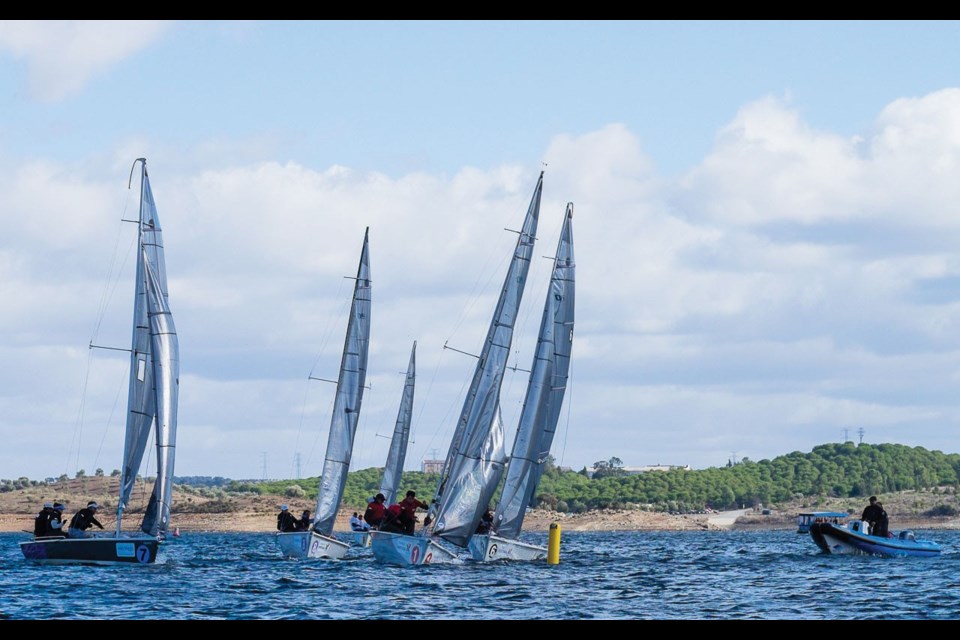I crossed into southern Portugal from Spain's Rosal de la Frontera border and turned northwest to nearby Grande Lago Alqueva. In 2002, Portugal completed the 96-metre-high dam on the River Guadiana, creating Portugal's largest artificial lake.
Several years of heavy rain filled the lake in a scant eight years, well ahead of projections, and created 1,200 kilometres of shoreline with a maximum depth of 100 m. The lake runs more than 80 km north-northeast into Spain and has brought water to a perennially dry part of the country advancing agriculture and jump-starting the local economy.
I was here to paddle my sea kayak, but the weather was foul. Waiting for the rain to stop, I noticed a car arrive towing a Laser SB20 sailboat and I chatted with the driver. Goncalo Lopes told me there was a "Champions Regatta" on the weekend with national champions from a variety of classes invited.
The potential of the lake is finally being realized and the town of Moura, together with private business, has become an advocate of development. This is the second year Sailing Cascais has held the Laser SB20 Champions Regatta, co-sponsored by Tourism Portugal, Tourism Alentejo and the town of Moura, and this year's event would be even better.
Sailing Cascais towed in eight sailboats and two RIB inflatables for the event, coordinating all logistics from transporting equipment to setting up a festival tent and organizing additional boats for race officials and spectators.
Chief operating officer Tiago Marcelino invited me to assist in rigging the boats Friday, and late in the afternoon asked if I would like to help in one of the committee boats over the weekend. My response was an enthusiastic, "Yes!" and Saturday morning saw me in an aluminum boat setting the marks with Goncalo.
Over the course of the day, I learned Goncalo achieved several top-10 finishes in Laser Radial World Championships and was now a coach at Sailing Cascais. He listed the who's who of Portuguese sailing, starting with Sailing Cascais CEO Vasco Serpa—who represented Portugal in the '96 Atlanta Olympics—and SB20 designer Tony Castro, who was spectating.
A team in red jerseys rounded the mark and Goncalo pointed out Hugo Rocha, Portugal's most-decorated sailor, '96 Olympic 470 class bronze medallist, multiple world champion in several classes and 2016 SB20 World Champion. On another boat, skipper Antonio Pereira is Snipe and SB20 National Champion and runner-up in the 420 class. Lead umpire Miguel Allen officiates at the highest levels, including America's Cup—and the impressive list went on.
The format was simple: Eight teams raced five races and switched out for the next eight, with the top three teams on each side qualifying for the semi-finals. The next eight teams had four races to send two to the semis.
As a sunny, windy Saturday of racing drew to a close, Vasco and Tiago insisted I come to the banquet that night in Moura hosted by the mayor's office. Dinner was an endless flow of traditional Alentejo cheeses, wines and dishes over several courses.
A gorgeous Sunday met the eight semi-finalists, and in five races, they were narrowed to four finalists. The champion was the first boat to win two races. The first race was won by a team from Cascais, but the next two were taken by the team of brothers Diogo and Pedro Costa (former 420 world champions and 470 Olympic contenders) and teammates Tiago Morais and Jose Maria Cunha. Rocha and his team placed second and Pereira's team third with rising star and Moth national champion Henrique Brites' team fourth.
Racing completed, prizes awarded, speeches made, and the event was over for most, but not the team from Sailing Cascais. Working well past dusk, they hauled the boats from the water, de-rigged and prepped for the task of transporting them 2.5 hours back to Cascais.
In casual conversation, Vasco's brother Luis said he heard my father was in the sailboat business, asking if it was a company he might know.
"Have you heard of C&C Yachts?" I asked.
"Wow! You are the son of Ian Morch?" he exclaimed, and we talked boats and boating.
I noted that as karma would have it, it would have been my father's birthday that day and I knew that destiny brought me to here. Participating in the regatta brought back an array of childhood memories and it could not have been a more fitting birthday tribute to our wonderful father and the sailing legacy in which we grew up.
Tim Morch is a chronic traveller who dreams of being a writer when he grows up. Whether in the saddle of a bicycle or motorcycle, the cockpit of a sea kayak, riding a wave or trekking a backcountry trail, Tim has a love of adventure and a passion for discovery. You can learn more about him at timmorch.com




